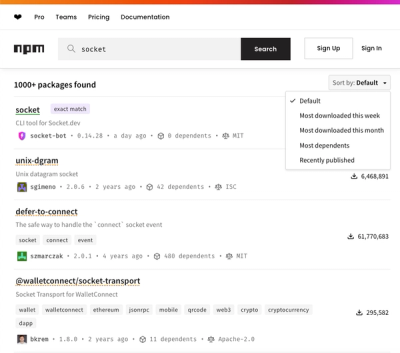
Security News
npm Updates Search Experience with New Objective Sorting Options
npm has a revamped search experience with new, more transparent sorting options—Relevance, Downloads, Dependents, and Publish Date.
A tool to build a Typescript based web app without pain.
You don't need to install and configure Webpack with a lot of plugins for Typescript, SASS, etc. Everything is already preconfigured for you
npx ffbt-init [PATH_TO_NEW_PROJECT]
Usually you don't need config. If you need to change default behaviour - see the config structure below
Create a file with name ffbt-config.js in the root of your project (near the package.json file)
module.exports = {
// FFBT is the environment-centric tool, almost all configuration is described in environments
// You can extend environments from each other
// All environments extend "default" automatically unless you specify "_extends" property.
// See the example below
environments: {
default: {
// It contains default values for all flags in the environment.
// See a list of all flags in the table below.
// Use it if you want to propagate values to all environments
},
development: {
// Used by default in `ffbt dev` command
},
production: {
// Used by default in `ffbt build` command
},
customProduction: {
// Custom env extended from the production. You can have as many custom envs as you need
// Usage example: ffbt build --env=customProduction
// Environment extension is a shallow merge
// For example, you want to make a bundle for production but without source maps
_extends: "production",
sourceMapType: "(none)",
}
},
aliases: {
// Aliases for the modules
// See resolve.alias in Webpack docs
},
noParse: [
// Restrict parsing of the specific modules
// Can help if you want to tune build performance
// See module.noParse in Webpack docs
],
configureWebpack: (projectConfig) => {
// Hook for customizing Webpack config
// You have access to the selected environment and helper for path calculation
// Just return the part of Webpack config and it will be merged with the main config automatically
},
};
| Name | Description | Type |
|---|---|---|
| browserlist | Currently used only in CSS Aftoprefixer. | string Syntax Docs |
| outputPath | Destination path, your bundle will be created here | string |
| sourceMapType | Source map type. | string Docs |
| staticFilesSizeThresholdKb | All assets with a size lower than the limit will be inlined, otherwise, they will be copied to the destination folder as is | number (Kilobytes) |
| entrypointName | An entrypoint file name without ts/tsx extension | string |
| tsconfigPath | Path to tsconfig file | string |
| devServerConfig | Settings for the WebpackDevServer. | object Docs |
| buildVersion | A string represents the version of the bundle. Accessible in your code via FFBT_BUILD_VERSION constant | string |
| showBuildNotifications | Enable/Disable build and type checker system notifications | boolean |
| enableTypeChecking | Enable/Disable typechecking for Typescript | boolean |
| cleanDistFolderBeforeBuild | The name speaks for itself | boolean |
| optimizeBundle | Minify and three-shake the output | boolean |
| enableCacheBusting | Add hashes to the output file names | boolean |
| buildStatsStyle | Control what bundle information gets displayed | minimal, normal, verbose |
| noParse | Webpack's module.noParse (Docs) | [] |
| aliases | Webpack's resolve.alias (Docs) | {} |
module.exports = {
environments: {
default: {
browserlist: "last 2 versions",
outputPath: "dist",
staticFilesSizeThresholdKb: 10,
showBuildNotifications: true,
enableTypeChecking: true,
cleanDistFolderBeforeBuild: false,
devServerConfig: {
port: 9393,
},
},
development: {
sourceMapType: "eval",
entrypointName: "index"
},
production: {
sourceMapType: "nosources-source-map",
optimizeBundle: true,
showBuildNotifications: false,
enableTypeChecking: false,
cleanDistFolderBeforeBuild: true,
entrypointName: "index.prod"
},
},
configureWebpack: () => {
return {
plugins: [
new OfflinePlugin(),
]
}
}
};
To analyze bundle just run ffbt dev|build --analyze
We use the following webpack plugins for analyzing:
Once you run the analyze command the generated report from webpack-bundle-analyzer will be opened.
You can find the report from bundle-stats-webpack-plugin inside the bundle-report folder inside your project.
You can compare bundles
# use the current bundle as a base for comparison
BUNDLE_STATS_BASELINE=true ffbt build --analyze
# do some operations with bundle (add/remove libraries, etc.)
# run analyze again
ffbt build --analyze
# open bundle-report/bundle-stats.html and see the comparison
FAQs
Build a Typescript app without pain
The npm package ffbt receives a total of 12 weekly downloads. As such, ffbt popularity was classified as not popular.
We found that ffbt demonstrated a not healthy version release cadence and project activity because the last version was released a year ago. It has 7 open source maintainers collaborating on the project.
Did you know?

Socket for GitHub automatically highlights issues in each pull request and monitors the health of all your open source dependencies. Discover the contents of your packages and block harmful activity before you install or update your dependencies.

Security News
npm has a revamped search experience with new, more transparent sorting options—Relevance, Downloads, Dependents, and Publish Date.

Security News
A supply chain attack has been detected in versions 1.95.6 and 1.95.7 of the popular @solana/web3.js library.

Research
Security News
A malicious npm package targets Solana developers, rerouting funds in 2% of transactions to a hardcoded address.